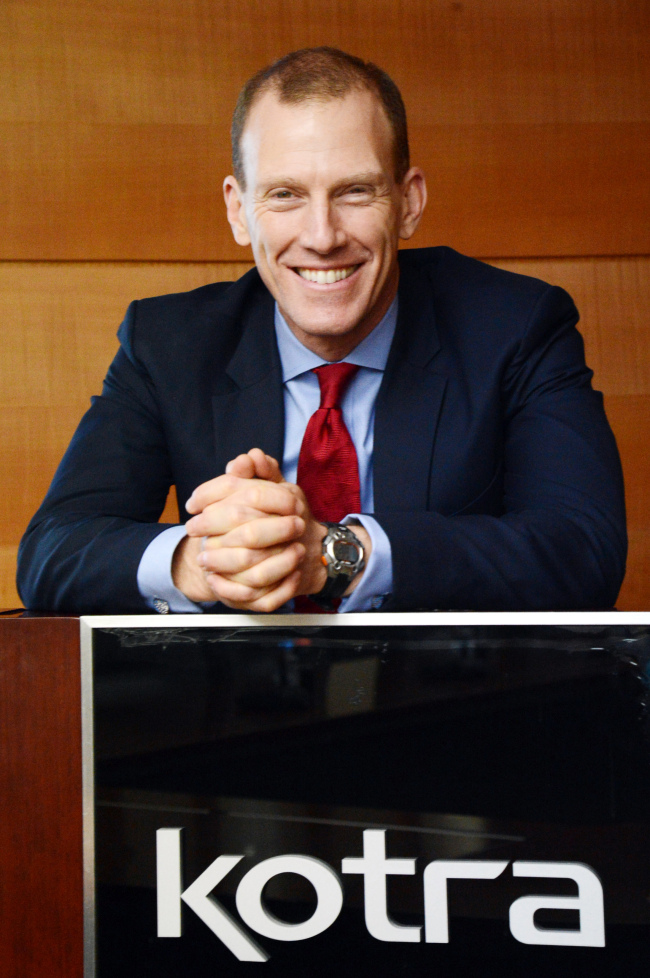A senior fellow at the independent Asia Society said the Korean market had potential, with a better investment environment for foreigners in some areas than even Japan and China.
"I am a big believer in Korea, and always have been,” said Jamie Metzl, who was named the U.S. investment advisory ambassador at the New York office of the Korea Trade-Investment Promotion Agency.
Korea’s current $1.5 million foreign direct investment, which accounts for only 1.3 percent of its gross domestic product, he said, is too low compared to the OECD standards.
Metzl, a partner of Cranemere, a New York-based investment holding company, is a prominent figure in foreign affairs. He worked at the National Security Council under the Clinton administration.
Metzl suggested that for global investors seeking to invest in value-added small and medium enterprises, Korea could be a more attractive investment destination than its East Asian neighbors.
“Japan and Korea are both great investment destinations, but the Korean economy is a bit more open than the Japanese, at least in many areas,” he said in an interview with The Korea Herald.
Many foreign-invested suppliers operating in Korea have complained about Japan’s lack of “openness” for foreign suppliers despite market demand, keeping the market to the local suppliers, according to market watchers.
Metzl also added that English skills in Korea are significantly better than in Japan.
The ambassador picked Korean SMEs, including those related to shipbuilding, gaming, app development and entertainment, as promising investment portfolios in Korea.
“One of the biggest opportunities for Korea is that the Korean economy has been a little bit lopsided,” Metzl hinted, pointing to the Korean business environment where the government is providing more support for the small and medium enterprises to balance out the chaebol.
“(The markets have) already begun to see a shift in providing more support for the small and medium enterprises, which creates a lot more opportunities in Korea for future growth,” he said.
The ambassador dismissed concerns that Korea would lose out to China, known for its cheap labor, in attracting foreign direct investment.
“People who invest in Korea are investing here because of innovation, creativity and great work ethic,” he said, noting that nobody is investing in Korea for cheap manpower.
“If all you want is cheap labor, maybe you want to invest in China, or maybe China is even becoming too expensive, and you might want to invest in Bangladesh or Vietnam.”
When asked if China and Korea would compete over the same U.S. investors, Metzl stressed that China’s emergence as an advanced economy is still an open question among global experts.
“The jury is still out as to whether China will be able to emerge from a lower-level production economy to a high-value-added economy. Certainly Japan and Korea have already made that jump, but it has been very difficult.”
“There have been many countries, including the former Soviet Union, that have excelled at the first phase of capitalist development, with highly labor-intensive, low-end production, which is something China is good at.”
In addition, the U.S. KOTRA ambassador urged that Korea, already headed toward an aging society, must strengthen its future growth engine through fostering SMEs, enhancing women’s work participation and extending the retirement age.
Korea’s female participation is relatively low by OECD standards, he said, despite signs of improvement.
Extending the retirement age so that older people could work longer will also help the country reduce poverty among the elderly, as well as the issues entailed by state assistance to the elderly, he added.
Metzl suggested that Korea could strengthen its presence in the global economy by joining the U.S.-led Trans-Pacific Partnership.
“Sooner is better than later, because the sooner Korea becomes a partner in the dialogue, the more influence Korea will have on its outcome,” he said.
Another government measure to attract more foreign direct investment would be strengthening dialogue with the global investors, he said.
He currently serves as a senior fellow of the Asia Society, an organization dedicated to the global promotion of mutual understanding and strengthening partnerships among peoples, leaders and institutions in Asia and the United States.
By Chung Joo-won (
joowonc@heraldcorp.com)








